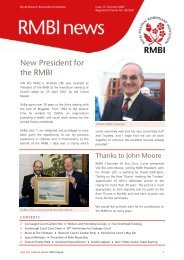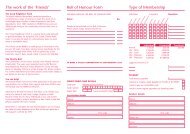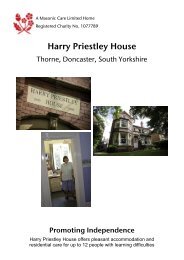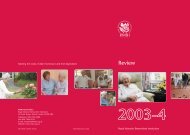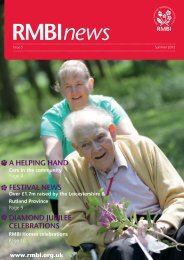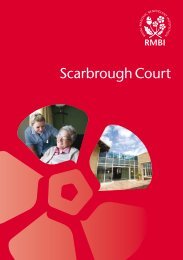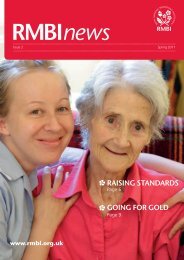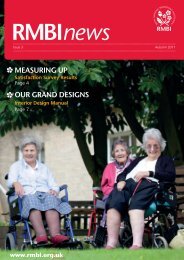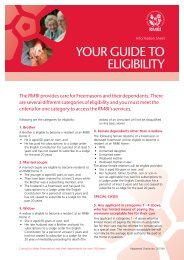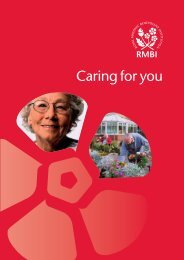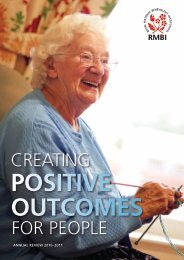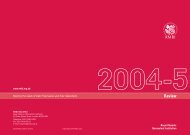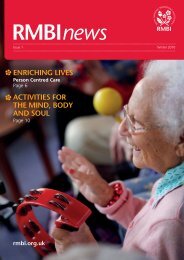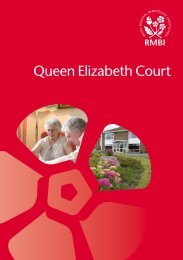Annual Review 2011/12 - Royal Masonic Benevolent Institution
Annual Review 2011/12 - Royal Masonic Benevolent Institution
Annual Review 2011/12 - Royal Masonic Benevolent Institution
Create successful ePaper yourself
Turn your PDF publications into a flip-book with our unique Google optimized e-Paper software.
IMPROVING END-OF-LIFE CARE | 13<br />
Committed<br />
to improving<br />
end-of-life care<br />
Living through the later stages of life is a sensitive and emotional journey – not only for<br />
the person who is at the end of their life, but also for their family. This is why the RMBI is<br />
committed to doing all we can to improve the quality of the end-of-life care offered in our<br />
Homes, to ensure that our staff offer care which respects residents’ individuality and maintains<br />
their dignity.<br />
“<br />
In <strong>2011</strong>-<strong>12</strong>, staff at a number of our<br />
Homes began accredited training on<br />
end-of-life care. Some have obtained<br />
accreditation from the Gold Standards<br />
Framework (a national standard of<br />
care for people nearing the end of<br />
their life), and some have embarked<br />
on other equally prestigious accredited<br />
schemes.<br />
Every person has different needs,<br />
but some worries are common to<br />
most people at the end of their life.<br />
Concerns include fear of abandonment<br />
and fear of being a burden. People at<br />
the end of their life also have concerns<br />
about loss of dignity and loss of<br />
control.<br />
The period at the end of life is<br />
different for each person. The signs<br />
and symptoms people have will vary<br />
as their illness or condition continues,<br />
and each person has unique needs<br />
for information and support. Through<br />
enhanced training and support we<br />
are able to make sure that a person’s<br />
care continues, with the emphasis on<br />
improving their quality of life and that<br />
of their loved ones, and on making the<br />
person comfortable.<br />
The RMBI places a great emphasis on<br />
ensuring that staff are appropriately<br />
trained and equipped to deliver care<br />
that is sensitive to meeting the needs<br />
of the individual and of their family.<br />
Staff are supported to ensure they have<br />
the confidence and know-how to help<br />
residents and their families with the<br />
medical, psychological, social, spiritual<br />
and emotional issues around dying.<br />
Communication about end-of-life<br />
care and decision-making during the<br />
final months of a person’s life is also<br />
important. Research has shown that,<br />
if a person is able to discuss his or her<br />
options for care early on, that person’s<br />
level of stress decreases and their ability<br />
to cope increases. Studies also show<br />
that people prefer an open and honest<br />
discussion about choices for end of life<br />
early on and are more satisfied when<br />
they have this conversation.<br />
Using the good practice methodology<br />
gained through their training, RMBI<br />
staff are enabled to support families<br />
and confidently address any questions<br />
and concerns that family members may<br />
have about the end-of-life care of their<br />
loved one.<br />
The care and<br />
support my mum<br />
and our family have<br />
received at the<br />
Home have been<br />
outstanding and<br />
the true meaning of<br />
humanity, dignity<br />
and compassion<br />
is completely<br />
understood and part<br />
of the being of all<br />
staff there, especially<br />
her carers in these<br />
past few difficult<br />
weeks. Words cannot<br />
possibly express our<br />
heartfelt thanks and<br />
gratitude.”<br />
A relative of a resident at<br />
Prince Michael of Kent Court, Watford



